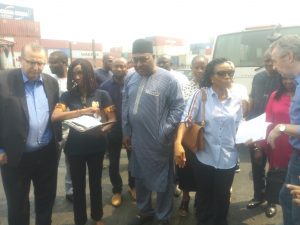Customs Abandoned 2000 Overtime Containers in Our Terminal, Laments PTML GM

The General Manager, PTML Limited, a terminal in Tin Can Island Ports, Mr. Tunde Keshiro weekend raised alarm over the abandonment of about 2000 overtime containers in its terminal by the Nigeria Customs Service (NCS).
Keshiro said his terminal has been waiting for the evacuation of the containers by the Customs to no avail, adding that these were occupying vital spaces in the facility.
Specifically, Keshiro told the visiting IMF team led by Mr Amine Mati, Chief Mission, Senior Representative for Nigeria Africa Department, that the containers were occupying 30 percent of the spaces in the terminal.
When asked by our Correspondent to estimate the number of overtime containers in the terminal, he said “between 1,000 and 2000”.
He equally expressed concerns that clearing agents do not come for delivery processes early enough.
According to him, even though the offices are open as early as 8 am, activities do not pick up till between 12noon and 1pm.
The Executive Secretary, Nigerian Shippers Council (NSC), Barr. Hassan Bello, who received the team in his office said every challenge in the Nigerian ports is being tackled by the federal government to have an efficient system as obtains in other advanced countries.
Bello assured that most of the challenges being faced now will soon be over with the current level of determination in addressing them.
He disclosed that there has been a synergy of government agencies and stakeholders in the ports to ensure that the dwell time of vessels calling at the nation’s ports is improved.
He also said his Council has been working with shipping companies to bring down the cost of shipping, adding that so much progress has been made in this regard.
“We are trying to build first of all, a Port Community System so that we will have operational synergy and then of course National Single Window which is the simplification of all processes, we need to be open and transparent, we have to reduce the corruption at the ports and we need to automate the ports for faster clearance of cargoes”
“What we are doing now is about 18-20days cargo dwell time, we want to reduce it to 7. The ship turnaround time also is 4.1, we want to reduce it further, we want to attract more cargoes here, not only for imports but also for exports and that is the whole issue”
“As we move to the ports, you will see that we lack efficiency at the ports. The ports are private sector driven, haven been concessioned about 12years back to the private sector, because we believe that the private sector should lead. However there are logistics problems, one of which is infrastructure”
“The roads in and out of the port is a challenge and the government is now working, constructing all the roads leading to the ports. Besides, the government is also going to introduce rail services into the ports, because the problems has been that we are using one mode of transportation, the ports have been stretched beyond their capacity”
“They are handling more cargoes than their intended capacity, so we have short term, medium and long term solutions for the ports”
Mati visited three terminals in Lagos ports, including APMT, Greenview and PTML where they were taken round the facilities.
Mati who spoke to newsmen after the inspection said the team was in the ports to find out the challenges, priorities and necessary policies introduced by the federal government in the area of trade facilitation.
According to him, “We were able to discuss the port congestion and noted that the clearance time still remains challenging, we are trying to determine the different policies and priorities put in place, particularly the scanners, national single window is very important to accelerate the process, the roads outside the port is also important for efficiency increase”
“As trade is picking up, the port is an important aspect of Nigerian economy, particularly in Lagos where the activity is”
“The Nigerian port is challenging as the stakeholders and agencies are recognizing, some of the challenges remains the logistics, the scanners, the single window clearance process, all needs to be accelerated so that goods can be discharged quickly”

